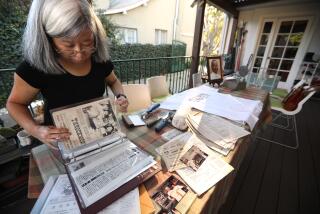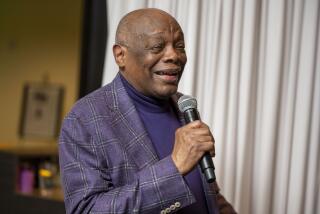For 80 years, Frank Fat’s has been ‘home away from home’ for politicians in Sacramento
Fortunately for California, Frank Fat didn’t obey this country’s immigration laws. He sneaked in illegally and achieved the American dream.
We’ve all been better off for it.
Couldn’t speak English. No green card. No money. Just forged papers with a fake name.
He arrived on a boat from China 100 years ago at age 16, seasick but determined to succeed. Did he ever.
Last week, a bunch of state Capitol old-timers — including ex-Gov. Jerry Brown, former San Francisco Mayor and Assembly Speaker Willie Brown and one-time Senate leader John Burton — packed the iconic Frank Fat’s restaurant to salute its 80th birthday.
Remarkably, Frank Fat’s is the only longtime major eating place around the Capitol that hasn’t eventually shut down. It did close for nine months in 1984 for a $1.2-million sprucing-up. When it reopened, 4,000 people turned out to celebrate.
One by one over the decades, other popular Capitol restaurants have shuttered: Bedell’s, Posey’s, Ellis’s, the Broiler, Chops and — just a few weeks ago — the Esquire Grill because of a stubborn quarrel about a new lease.
How has Fat’s managed to stay afloat? For one thing, the Fat family has always owned the property. No lease problems.
“Maybe it’s Asian culture,” says Jerry Fat, Frank’s youngest son who now runs the company business that includes three other restaurants and a catering service. “We don’t go into debt a lot. Also, we’ve been able to diversify into commercial real estate.”
But most important, it’s how the Fats have consistently run their flagship restaurant.
“You give people good food, a nice place to eat it in and make them happy. Pretty simple, really,” Frank Fat once explained.
Fat’s enjoys a hallowed place in Capitol lore because it’s the living symbol of a long-gone era of political cordiality and bipartisanship. Democrats and Republicans often worked together to pass important legislation. And frequently the deals were cut over drinks and dinner at Fat’s.
The most famous was the 1987 “napkin deal.”
Lobbyists for trial lawyers, insurers, doctors and tobacco convened at Fat’s one summer evening to negotiate the final chunk of a product-liability peace pact. Senate Judiciary Committee Chairman Bill Lockyer — later the Senate leader — scribbled the pact on a linen napkin and the lobbyists signed it.
“Everybody was handing me yellow pads,” Lockyer once told me. “I thought it would be more theatrical to write on a napkin. I wanted to create more Capitol lore.”
A copy of the napkin is framed at Fat’s.
“The thing Fat’s contributed most to bettering humanity is that people learned they could disagree with each other politically and still be friends,” says retired lobbyist George Steffes, who was a top advisor to Gov. Ronald Reagan.
Fat’s was the legislators’ “home away from home,” Burton told the birthday party crowd, recalling the lawmakers’ thinking: “The food’s good, the food’s consistent and if you find a lobbyist, the price is right.”
Lobbyists were plentiful at Fat’s and they usually sprang for the legislators’ drinks and dinner.
The kingpin was the late James D. “Judge” Garibaldi, who represented liquor interests and the California Highway Patrol. He enjoyed buying a round for the bar and shouting: “This drink’s on the Highway Patrol.” The restaurant’s featured booth is named for Garibaldi.
“I eat here twice a month,” Willie Brown told the partiers. “I still sign Garibaldi’s name.” Everyone laughed.
All that wining and dining by lobbyists made reformers wince. But these days, rather than pop for $30 meals, lobbyists routinely kick in $3,000 at legislators’ fundraisers. And nobody has much fun.
Jerry Brown ended the lobbyists’ bar spending in 1974 by sponsoring a ballot initiative that limited their tabs per legislator to $10 a month — “enough for two hamburgers and a Coke,” he said.
Brown ate often at Fat’s when he was governor in the 1970s. He liked Yu Kwok fried dumplings and Sang Gai Shee chow mein.
He was a bachelor then, Brown recalled, and didn’t cook in his apartment. So he’d hit Fat’s late at night and eat with the cooks.
Frank Fat — real name Dong Sai-Fat — was born in 1904 in a small village in southern China. He heard about America’s “gold mountain” and decided to migrate. But the U.S. had the Chinese Exclusion Act. It barred any Chinese citizen from entering the country unless he was traveling with an immediate relative who was a legal American resident.
So Fat’s grandfather paid a traveler $1,000 to pose as Frank’s dad. Frank — a name he adopted years later — carried phony papers identifying himself as Wong Bing-Yuen.
He picked fruit, washed dishes, swept up, waited tables — in Sacramento, Detroit, Chicago — endured discrimination and even slept nights on the stone steps of a restaurant basement.
A big break came when he was a waiter at a Chinese restaurant in Sacramento. A state official asked him to place a keno bet. But the official left before learning that he’d won $900. Fat kept his winnings for him until the guy returned several weeks later. The official was so impressed, he arranged for a $2,000 loan so Fat could open his own Chinese restaurant in a run-down former speakeasy two blocks from the Capitol.
That was 1939. Full-course dinners started at 50 cents; lunches 25 cents. “Try Frank’s special steak,” a flier read. “They’re delicious.”
They still are, smothered in sauteed onions and oyster sauce. Today’s price: $35.75.
Frank died in 1997 and was replaced as full-time restaurant host by popular eldest son Wing, who died in 2005.
Hopefully Frank Fat’s will never die.
More to Read
Start your day right
Sign up for Essential California for news, features and recommendations from the L.A. Times and beyond in your inbox six days a week.
You may occasionally receive promotional content from the Los Angeles Times.







